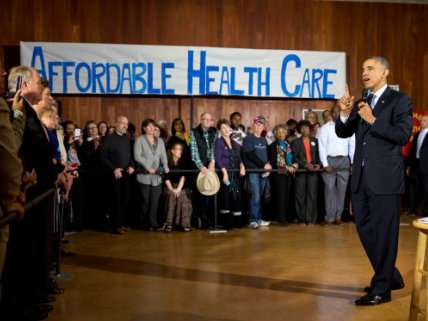The Problem With Obamacare Isn't That It Was Designed to Fail—It's That It Was Designed to Pass
The law's failures stem from its many compromises and concessions to political reality.

Was Obamacare purposely designed to fail in order to pave the way for an even greater government takeover of the health care system? This is an idea I have heard in various forms for years, and it's getting some attention again thanks to an op-ed in The Hill which charges that Obamacare was merely a setup for a far more intrusive policy reform.
The piece, by California based doctor Jeffrey Barke, is framed as a response to patients who wonder why the health law's architects didn't see its current problems coming. In response, he wonders: "What if they did? What if ObamaCare was purposely designed to fail?" This is not really a question so much as a way of floating a theory for which he does not have much evidence.
He argues that when Obamacare was passed back in 2010, "President Obama and Democrats in Congress wanted to fundamentally revolutionize health care," but that public opposition prevented them from passing a more sweeping bill.
Yet "liberals never backed down from the radical healthcare dreams that were dashed by the American people in 2010," he writes. "They simply needed to bide their time and lay the groundwork. That's why they rushed to pass ObamaCare with so little debate, and without a single Republican vote. Its authors purposely designed the law so that it would fail. And when it did, they could return to the American people with the promise that even greater government intervention in healthcare could end the ObamaCare nightmare."
This is both an odd reading of the history and a thoroughly unconvincing theory of political change. One the one hand he argues that the law's scope was limited due to public opposition; on the other hand he argues that it was rushed through with little debate. If Democrats could rush through anything they wanted without opposition or debate, why not pass the more sweeping bill he claims they preferred? Especially if the plan was to wait until the law failed and then mount yet another risky political campaign in which they would finally pass the law they wanted to see—but this time without the certainty of control of the White House and majorities and Congress, and with the original law's failure as potentially damaging political context?
His idea, basically, is that in 2009 and 2010, Democrats covertly worked together to use their unusual dominance of American government to make the public upset with them by passing a failed law in hopes that the public would give Democrats another chance to pass something even more sweeping later. It is a Rube Goldberg theory of political action that relies on an implausible level of secret coordination in service of a foolish plan of action.
The reality is that Obamacare was debated extensively for the better part of a year. Indeed, it is hard to remember another piece of domestic policy legislation that inspired so much debate and discussion. And while critics successfully predicted many of the law's failures (as well, to be sure, as some problems that did not come to fruition), Democrats believed that those problems would either not occur or would not be significant enough to cause the law to fail. Democrats—especially those in leadership—did not believe the law would fail; on the contrary, they believed when the law passed that it would be successful and politically popular. That belief turned out to be incorrect, but all evidence suggests that the belief was sincere at the time.
These sorts of unlikely conspiracy theories make for attractive explanations, because they allow one to identify scheming villains with nefarious master plans. In reality, politics, which must account for the converging and diverging interests of many people and parties with very different interests, is far more complex. Indeed, the complexity that results from the interaction of those interests is often the source of policy problems.
Barke is right that Democrats did not all get exactly the law they hoped for in Obamacare; the bill was designed as a series of concessions and payoffs to various interest groups and stakeholders and elected officials.
Not only did the law have to pass in the House, it had to find 60 votes in the Senate, which, in the absence of Republican support, meant securing the support of wavering centrist Democrats. The law's designers—fearing the sort of industry backlash that had helped kill a health care overhaul under Bill Clinton in the 1990s—had to ensure that it would not upset industry groups, like drug makers or insurance companies or hospitals, too much, and that doctors, an influential and widely admited constituency, would be on board too.The law's architects also had to design a system that did not radically upset the existing mixed public-private structure of the American health care system too much, and, in particular, would allow the majority of Americans who already had coverage and liked it to keep their existing insurance coverage and providers (this front was so important that they ended up misleading the public). Parts of the law were delayed in order to keep its ten-year price tag artificially low. Other elements were delayed in order to appease unions.
As a result of all this and more, Obamacare was a deeply compromised piece of legislation. Those compromises and concessions were made in order to ensure that the Affordable Care Act could secure enough votes to become law, and without them, it is unlikely that the bill would have become law. But those same compromises have also contributed to some of the particulars of its current struggles by rendering its already inherently complex policy scheme even more awkward and unwieldy. In other words, the problem with Obamacare isn't that it was designed to fail—it's that it was designed to pass.


Show Comments (73)